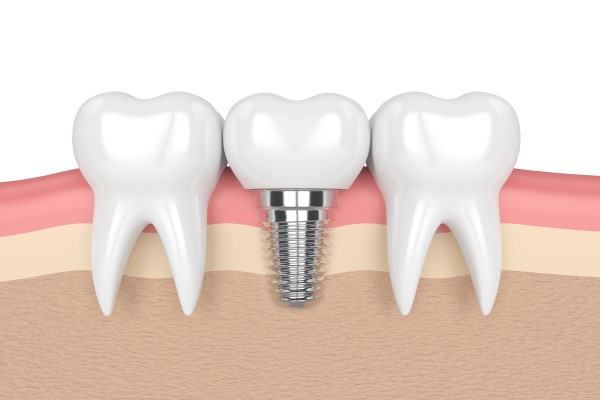An Overview of Implant Dentistry Treatment

Considering an implant dentistry procedure? Read on to learn more about this type of restoration. With implant dentistry, replacing missing teeth has never been easier, and these restorations are generally indistinguishable from natural teeth. Dentists are often asked about how implant dentistry works. Due to the innovative structure of dental implant restorations, they are far stronger and more stable than more traditional restorations such as a fixed dental bridge or a removable denture.
Implant dentistry: a strong and stable dental restoration solution
Implant dentistry, which involves the use of dental implants to support replacement teeth, is growing in popularity and is available to more patients than ever before. The following review discusses implant dentistry, highlighting why an implant can be so strong and stable.
Reviewing the strength and stability of dental implants
Dental implants are made of titanium, which is quite strong and resistant to damage. In addition, the titanium implant fuses together with the bone inside of the jaw, providing a natural and durable hold for the chosen dental restoration (crown, bridge, or denture). In fact, it is not uncommon for a dental implant to last for more than 20 years if the patient cares for their teeth and gums properly.
Why dental implants are so strong and durable
As mentioned above, dental implants are made of a strong and durable titanium metal material that is incredibly resistant to damage. More notably, they fuse together with the jawbone through a process called osseointegration. This reinforces their strength and makes them even stronger and more stable. Due to the superior strength of dental implants, complications are incredibly rare, and more than 95% of dental implants patients have successful treatment (American Association of Oral and Maxillofacial Surgeons).
Additional benefits of implant dentistry
In addition to the longevity of dental implants, another notable benefit of implant dentistry is that dental implants are able to preserve the density of the jawbone, which is not the case with alternative solutions such as removable dentures. In addition, implant restorations are non-removable and not at notable risk of coming loose. Due to the strength and stability of dental implants, patients are able to eat their favorite foods without fear of their restoration coming loose. Implant restorations also look indistinguishable from natural teeth and offer optimal aesthetic benefits.
The types of implant dentistry options
Implant dentistry can address a range of tooth replacement concerns. Whether you need to replace a single missing tooth or an entire row, dental implant restorations can meet your needs. The three common types of implant dentistry are implant-supported dental crowns, implant-supported bridges (partial dentures), and implant-supported complete dentures.
How do implants compare to non-implant solutions?
There are three common methods for replacing missing teeth, which are implant restorations, fixed dental bridges, and removable dentures. Fixed dental bridges, which involve the attachment of a dental crown to abutment teeth (rather than dental implants) require a less invasive process than implant restorations; removable dentures require even less of an invasive process. However, non-implant restorations are not as durable and stable, resulting in shorter longevity and a higher risk of coming loose or falling out at an inopportune time.
How to get the most out of your dental implant restoration
Dental implant restorations are easy to care for. To get the most out of them, be sure to brush regularly, limit (or avoid) foods, drinks, and drugs that could damage the gums, natural teeth, and restorations, and visit the dentist for all scheduled check-ups and dental cleanings. It is also important to reduce the risk of dental trauma as much as possible. This is especially important for individuals who play contact sports, have a dangerous occupation, and/or have dealt with bruxism (teeth grinding at night) in the past. With proper care, your dental implant restorations should last for more than a decade.
Ready to schedule your appointment?
The strength and durability of titanium dental implants, along with the fusion between the implants and the jawbone, create a strong and long-term hold for replacement teeth, whether the restoration is a crown, bridge, or complete denture.
Here at our dental practice, we offer implant dentistry services, and we take pride in assisting our patients through every step of the treatment process, from the consultation visit to providing aftercare after treatment is complete. To learn more and to start the implant dentistry treatment process, call us or send us a message today.
Request an appointment here: https://www.palmbeachdentistry.com or call Palm Beach Dentistry at 5612252057 for an appointment in our Delray Beach office.
Check out what others are saying about our dental services on Yelp: Implant Dentist in Delray Beach, FL.
Recent Posts
Sleep apnea is a serious sleep disorder that affects millions of individuals worldwide. It occurs when breathing repeatedly stops and starts during sleep, disrupting rest and potentially causing long-term health consequences. Many people are unaware that a general dentist plays a key role in diagnosing and managing sleep apnea, particularly with non-invasive treatment solutions. By…
Choosing an extraction over a dental restoration can be easy for some people, especially if the pain is intense. For others, sacrificing a natural tooth would be devastating. Consulting a dentist about the final decision is important. Here are the details on whether the better option is dental restoration or extraction.The dentist can assess the…
Typing dentist near me in your search box can give you a great start. Getting comprehensive oral care from the right dental care professional is the goal. A provider near you will give you easier access to necessary dental treatments. Entering dentist near me in your online search can give you an advantage in your…
A good dental restoration can improve your oral health and quality of life. It is important to have a comfortable bite so that you can perform basic activities without any distracting pain. Knowing the advantages of these procedures can motivate you to set an appointment soon. Here are some dental restoration benefits that you can…


